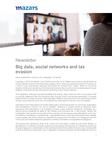
Big data, social networks and tax evasion
Last May 2, 2019, the director of the DIAN announced on his Twitter account that he would follow up on the historical record of the trips of tax evaders, since "there are people who travel to Europe 3 or 4 times a year and declare expenses and assets far removed from reality". What no one would imagine is that such monitoring of the historical record of trips could not only be taking place through Migración Colombia but also through the monitoring of their social networks.
This hypothesis -although it sounds incredible and remote- might not be so much, if we analyze what is currently happening with the monitoring that, through Ruta N and several specialists in analysis and processing of large amounts of data (big data), Medellin is doing to those who operate businesses through social networks and have not registered as responsible for the tax in the municipality.
According to the Public Sector Innovation Observatory of the Organization for Economic Cooperation and Development (OECD), the city of Medellín undertook a project aimed at detecting which businesses were developing in its jurisdiction through social networks (Instagram, Facebook, etc.) without having registered as liable for the industry and commerce tax in that locality. Initially, the investigation was carried out manually and an average of 6 businesses were detected for each hour of traditional investigation. Subsequently, understanding that a more technified search was needed, a local supplier was hired to design an algorithm to compare the information from Instagram with that of the local and mobile telephone operators to identify businesses not registered as taxpayers.
This project was selected by Ruta N as a pilot that could obtain funding through three phases: a) development of software to identify people and businesses that develop non-traditional commerce through Instagram; b) identification of the individuals behind the profiles (through cross-checking with local and cell phone companies); and c) integration of these businesses into the traditional economy through -initially- an educational campaign. A preliminary result shows that there are 2,337 new "virtual" businesses that could be required to pay industry and commerce taxes on income obtained in Medellín.
Taxation in social networks implies having a real understanding of the new business trends that are developed through digital platforms, because not everything in this new world is "black and white". Thus, there are businesses belonging to the collaborative economy or collaborative consumption (P2P), such as exchange of goods or services (or goods for services, or services for services) or simply the association or "pooling" of people to share costs for a certain purpose; crowdfunding activities; online sales models where the website does not produce or store the product ("dropshipping") and "youtubers" or "influencers" who -subtly and discreetly- promote ideas or products in exchange for followers or "likes" that they can later redeem in money.
Thus, the control of social networks implies having a broad understanding of how this type of business is developed, otherwise the ecosystem could be disturbed by the arbitrary intervention of the State in this new digital economy.
While no one denies the right of the tax authorities to investigate taxpayers who may be in default, there is a tension between such right and the constitutional right to privacy of individuals and the non-infringement of communications by the State without a court order. Ignoring this tension could result in the next step being to monitor WhatsApp groups, Facebook groups, emails, cellular lines and so on, under the pretext of being investigating a tax omission or evasion.
Or even worse, it could lead to the tax authorities - hiding under false profiles of buyers or followers - to use the figure of "entrapment" to induce people to commit a tax offense, and then be prosecuted for it.


